Rachel Dodge's Blog, page 6
October 11, 2022
Austen in a Box: Autumn at Chawton
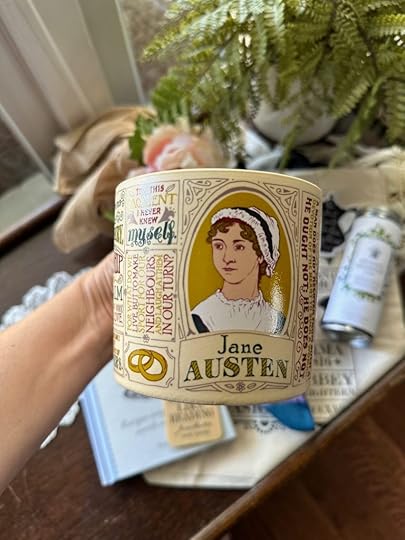
I just received my first Jane Austen Box from Regency Marketplace, and the minute I opened it, I knew I had to share it with all of my friends here at Jane Austen’s World. This is a beautiful Jane Austen-themed experience not to be missed–and it comes right to your own front door!
Special thanks to @regency_marketplace for sending me the “Autumn At Chawton Cottage” box this month so I could fully experience it for myself! This delightful box is filled to the brim with cozy Autumn and Jane Austen-themed items! I can’t wait to put on my cute new socks and have a cup of tea!
 Box Full of Surprises
Box Full of SurprisesEach Jane Austen Box features a range of products from items of historical interest to lovely items you can incorporate in your everyday life, edibles and fine teas to Jane Austen inspired products. All boxes also include some form of book — expand your library!!
Categories include, but are not limited to:
Fine TeasBooksCandlesEdiblesWearablesItems of Historical InterestJane Austen Inspired ProductsBath and BodyHome DecorWriting AccessoriesBooklovers ParaphernaliaAnd More!Subscription boxes are delightful because there are so many surprises held within each box. Regency Marketplace does a lovely job of keeping the mystery alive. They give hints and a theme for each box, but they never show what specific items are coming in each season. That makes it even more exciting to open when it comes in the mail!
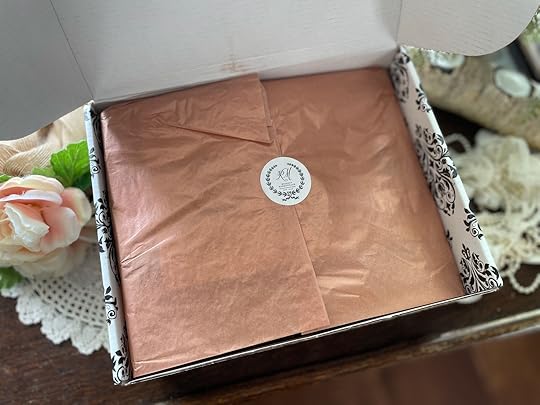 Unboxing
UnboxingOne of the most exciting parts about getting any kind of subscription box is the actual unboxing. When it arrived, I was so impressed with the packaging and the beautiful box. When I opened it and saw the pretty tissue and the sticker, I almost couldn’t bring myself to open it. I snapped a picture because it felt like my birthday and Christmas had arrived all at once.
If you like to watch an unboxing video of me first opening the box, you can view it HERE. I had a blast (and it was my first time making a video reel like it).
Here are some photos of what I found inside:


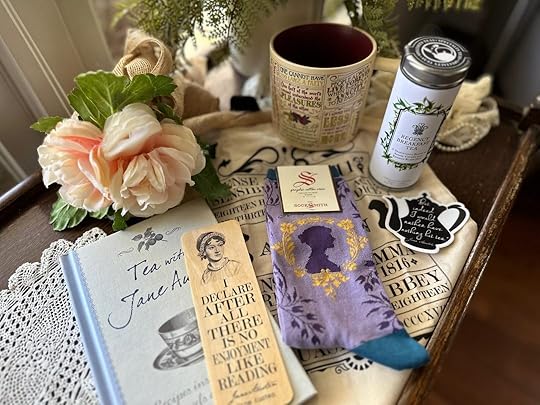


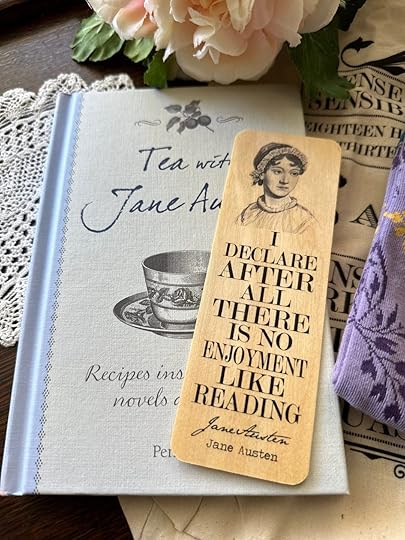
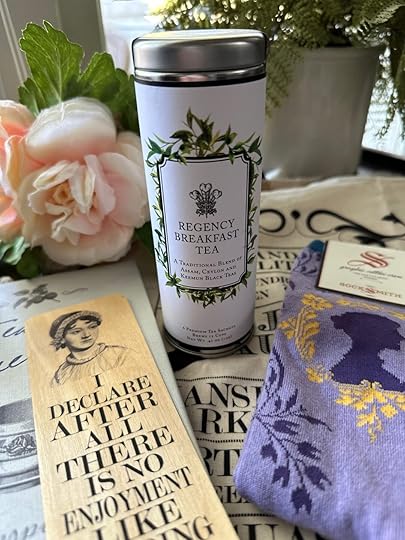
 Coming Soon!
Coming Soon!The Winter Jane Austen Box will be available for Pre-Order October 15th – November 15th, and boxes will ship in early December. Read the Theme Announcement here!
You can use my special COUPON CODE for 10% off the Winter Box!
Regency Marketplace offers free shipping in the US. (International flat rate shipping is also available.) These luxurious boxes sell out quickly, so make sure to reserve one for yourself or for a friend. This is the perfect gift for the Jane Austen fan in your life!
About Regency MarketplaceRegency Marketplace is run by the lovely Christina Denton. It was envisioned many years ago as a beautiful oasis for all things Regency and Jane Austen: a place where one could escape from the breakneck pace of today’s world, and enter into an era of elegance, charm, and wit.
A lifelong love of Jane Austen and the Regency Era is the guiding influence behind Regency Marketplace. As a family-run company, they work hard to source the best products for their discerning customers and fellow Janeites! They focus on celebrating the grace and beauty of an Era so distinct that it still captivates us two hundred years later.
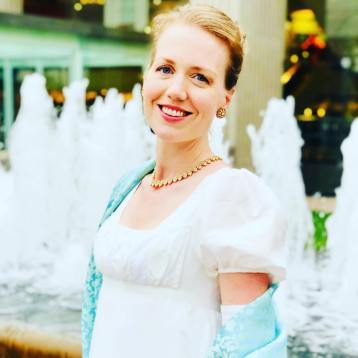
Is this something you would like to receive as a gift? Would you buy it for yourself or for someone else as a lovely surprise?
The post Austen in a Box: Autumn at Chawton appeared first on Rachel Dodge.
September 28, 2022
The Secret Garden Devotional

I’m so excited to share with you my newest devotional book that’s coming this Fall: The Secret Garden Devotional: A Chapter-by-Chapter Companion to the Beloved Classic!
“It was the sweetest, most mysterious-looking place anyone could imagine.” – Frances Hodgson Burnett
Devotional Inspiration from Mary Lennox’s Beautifully Mysterious Secret GardenThe Secret Garden Devotional offers lovely inspiration that explores the themes of faith, family, contentment, wisdom, and joy in the classic Frances Hodgson Burnett novel, cherished by generations of readers.
Each reading corresponds with a chapter from the book and invites you to embrace God’s guiding hand in your life as you are becoming His new creation. With themes of growth, spiritual nourishment, God’s love and care, and His transforming power, this beautiful chapter-by-chapter devotional includes original artwork throughout. Each reading includes examples from the novel, scripture, life application, and prayers perfect for groups, book clubs, or personal reflection.
Order Copies Here From Barbour Publishing October 31st
From Barbour Publishing October 31stOrder your copy today!




 Delivers Worldwide to over
Delivers Worldwide to over160 countries
The post The Secret Garden Devotional appeared first on Rachel Dodge.
September 16, 2022
More Than One Banana

In her book Evidence Not Seen, Darlene Deibler Rose describes something incredible that happened when she was a prisoner at the Japanese Kempeitai prison in New Guinea during World War II.
After living on almost nothing for many weeks, Darlene recounts how she began to crave bananas after witnessing a fellow prisoner receive a bunch of bananas in secret from someone outside the walls of the prison:
“Everything in me wanted one. I could see them; I could smell them; I could taste them. I got down on my knees and said, ‘Lord, I’m not asking You for a whole bunch like that woman has. I just want one banana.’ I looked up and pleaded, ‘Lord, just one banana.’”
After praying, she began to “rationalize” her request—“How could God possibly get a banana to me through these prison walls?” She knew she could never ask one of the guards, and it would be too dangerous to ask anyone else. She prayed again in defeat, saying, “Lord, there’s no one here who could get a banana to me. There’s no way for You to do it.”
The next day, she was visited by the commander from her prison camp, a man named Mr. Yamaji, whom she had come to know and respect. After he left, a guard came to her cell, and “with a sweeping gesture,” laid bananas at her feet. It wasn’t just one banana; there were ninety-two bananas!
Overwhelmed and beside herself with awe, she began to pray, saying, “Lord, forgive me; I’m so ashamed. I couldn’t trust You enough to get even one banana for me. Just look at them—there are almost a hundred.”
And then she heard God’s answer in her heart: “That’s what I delight to do, the exceeding abundant above anything you ask or think.” She knew then that nothing was impossible with God.
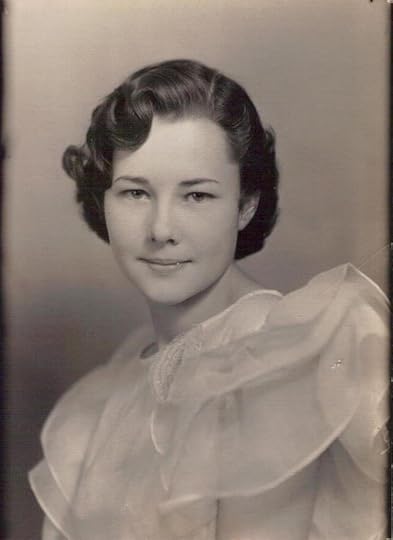 Darlene Deibler RoseOne Banana
Darlene Deibler RoseOne BananaThe reason I love Darlene’s story so much is that I often ask for one proverbial banana in my prayers without even realizing it.
Do you ever do that? Get to the point where you’re so desperate, beaten down, and overwhelmed by the circumstances surrounding you that you can barely ask God for just one banana?
This happened to me recently as I prayed over a situation I was facing. My heart was heavy, and I was pleading with the Lord, asking him to move and work in a specific way. In my desperation, I asked God to provide one blessing—just one. In that moment, I was startled—almost interrupted, even—by the Lord’s still, small voice, saying, “That’s all you’re going to ask me to do? You know me better than that. Ask me for more.”
Darlene’s story immediately popped into my mind, even though I had read her book more than a decade prior, and I was convicted that I had been praying for one banana. I had been praying tentatively, hardly believing that God would answer my prayer. I knew in that moment that God was inviting me to freely ask him for much, much more.
What do you do when you’re faced with a seemingly impossible situation? When you can’t see any way around, over, or through a problem? When it seems like God would literally have to conjure something up out of nothing?
In those moments and seasons, it’s as if our faith is pressed and pummeled to the point that we can barely summon up one mustard seed’s worth of “He can do it.”
We rationalize the impossibility of our prayers—prayers for deliverance, for restoration, for healing, for salvation, for recovery. For freedom, provision, purpose, and reconciliation. It looks like it just can’t happen.
We’ve known disappointment. We’ve experienced defeat. We figure maybe this is just the way it’s got to be.
We know it will take an absolute miracle.
But here’s the thing. God can do what no one else can do. When you’re scraping the bottom of the barrel and you’ve got nothing left to give, when you know there’s nothing anyone can do and it seems like you’ve exhausted all your options, that’s when you realize there are some things only God can do.
And God is really good at doing the things only he can do.
Finally, let me encourage you with this: If you’re praying for something that seems as impossible as a bunch of bananas being sent to you through a prison wall, remember Darlene’s story. The answer may not come immediately, and it may not come tomorrow or the next day, but God will answer. He will provide. Don’t give up hope.
Remember, our God “is able to do exceedingly abundantly above all we ask or think” (Eph. 3:20 KJV).
Tonight, when you’re praying as you go to bed, imagine Jesus whispering these words to your heart: “You’re asking me for one banana. You know me better than that. Ask me for a hundred bananas. Ask me for a feast.”
Grace and peace,
Rachel
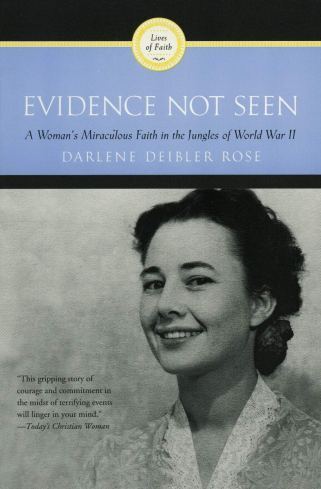
About the Book: Evidence Not Seen is one of the most incredible missionary stories I’ve ever read! If you’d like to read it, you can order it HERE.
This article was originally published on The Glorious Table. You can access the full article HERE.
Photo credit: “Woman Praying” by Ben White on Unsplash.
The post More Than One Banana appeared first on Rachel Dodge.
Ask Him for MORE

In her book Evidence Not Seen, Darlene Deibler Rose describes something incredible that happened when she was a prisoner at the Japanese Kempeitai prison in New Guinea during World War II.
After living on almost nothing for many weeks, Darlene recounts how she began to crave bananas after witnessing a fellow prisoner receive a bunch of bananas in secret from someone outside the walls of the prison:
“Everything in me wanted one. I could see them; I could smell them; I could taste them. I got down on my knees and said, ‘Lord, I’m not asking You for a whole bunch like that woman has. I just want one banana.’ I looked up and pleaded, ‘Lord, just one banana.’”
After praying, she began to “rationalize” her request—“How could God possibly get a banana to me through these prison walls?” She knew she could never ask one of the guards, and it would be too dangerous to ask anyone else. She prayed again in defeat, saying, “Lord, there’s no one here who could get a banana to me. There’s no way for You to do it.”
The next day, she was visited by the commander from her prison camp, a man named Mr. Yamaji, whom she had come to know and respect. After he left, a guard came to her cell, and “with a sweeping gesture,” laid bananas at her feet. It wasn’t just one banana; there were ninety-two bananas!
Overwhelmed and beside herself with awe, she began to pray, saying, “Lord, forgive me; I’m so ashamed. I couldn’t trust You enough to get even one banana for me. Just look at them—there are almost a hundred.”
And then she heard God’s answer in her heart: “That’s what I delight to do, the exceeding abundant above anything you ask or think.” She knew then that nothing was impossible with God.
 Darlene Deibler RoseOne Banana
Darlene Deibler RoseOne BananaThe reason I love Darlene’s story so much is that I often ask for one proverbial banana in my prayers without even realizing it.
Do you ever do that? Get to the point where you’re so desperate, beaten down, and overwhelmed by the circumstances surrounding you that you can barely ask God for just one banana?
This happened to me recently as I prayed over a situation I was facing. My heart was heavy, and I was pleading with the Lord, asking him to move and work in a specific way. In my desperation, I asked God to provide one blessing—just one. In that moment, I was startled—almost interrupted, even—by the Lord’s still, small voice, saying, “That’s all you’re going to ask me to do? You know me better than that. Ask me for more.”
Darlene’s story immediately popped into my mind, even though I had read her book more than a decade prior, and I was convicted that I had been praying for one banana. I had been praying tentatively, hardly believing that God would answer my prayer. I knew in that moment that God was inviting me to freely ask him for much, much more.
What do you do when you’re faced with a seemingly impossible situation? When you can’t see any way around, over, or through a problem? When it seems like God would literally have to conjure something up out of nothing?
In those moments and seasons, it’s as if our faith is pressed and pummeled to the point that we can barely summon up one mustard seed’s worth of “He can do it.”
We rationalize the impossibility of our prayers—prayers for deliverance, for restoration, for healing, for salvation, for recovery. For freedom, provision, purpose, and reconciliation. It looks like it just can’t happen.
We’ve known disappointment. We’ve experienced defeat. We figure maybe this is just the way it’s got to be.
We know it will take an absolute miracle.
But here’s the thing. God can do what no one else can do. When you’re scraping the bottom of the barrel and you’ve got nothing left to give, when you know there’s nothing anyone can do and it seems like you’ve exhausted all your options, that’s when you realize there are some things only God can do.
And God is really good at doing the things only he can do.
Finally, let me encourage you with this: If you’re praying for something that seems as impossible as a bunch of bananas being sent to you through a prison wall, remember Darlene’s story. The answer may not come immediately, and it may not come tomorrow or the next day, but God will answer. He will provide. Don’t give up hope.
Remember, our God “is able to do exceedingly abundantly above all we ask or think” (Eph. 3:20 KJV).
Tonight, when you’re praying as you go to bed, imagine Jesus whispering these words to your heart: “You’re asking me for one banana. You know me better than that. Ask me for a hundred bananas. Ask me for a feast.”
Grace and peace,
Rachel

About the Book: Evidence Not Seen is one of the most incredible missionary stories I’ve ever read! If you’d like to read it, you can order it HERE.
This article was originally published on The Glorious Table. You can access the full article HERE.
Photo credit: “Woman Praying” by Ben White on Unsplash.
The post Ask Him for MORE appeared first on Rachel Dodge.
August 29, 2022
Breathe on me, Breath of God.

“You have listened to fears, Child. Come, let me breathe on you. Forget them. Are you brave again?” – Aslan, Prince Caspian by C.S. Lewis
What comes to mind when you read these words? What thoughts, memories, longings?
When I read those words, there’s an ache to be close to Aslan and to meet him in person because he makes me feel safe. The very word “Child” brings deep security, thankfulness, peace. The words, “Come, let me breathe on you” are loving and tender. There is no judgment.
I imagine his breath is sweet and warm and comforting, like a warm summer breeze. Perhaps there is a tang of spice too. He is a lion, after all.
Oh, to step into C.S. Lewis’s Narnia and have Aslan breathe on us! Can’t you just see him so vividly and imagine yourself standing in front of him? His mane, his hugeness, his eyes. Wouldn’t it be wonderful?
And yet, even Aslan is only a beautiful glimpse into the truth of who God is.
I’m here to remind you that our true Aslan – Jesus – is bigger, kinder, more loving, more powerful, more beautiful, and more able than you or I could possibly ever imagine.
When God breathes on us, fear fades and hope rises. Courage comes in. Faith is enlarged. Victory is found.
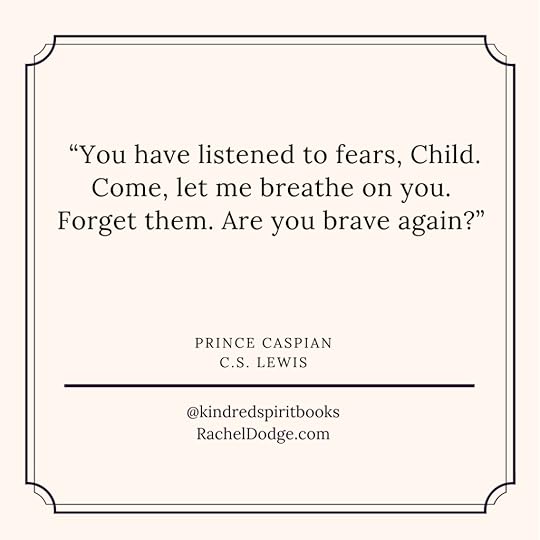
What fearful thoughts have you been listening to? What fearful emotions have been taking over?
Let’s take all our named and unnamed fears to Jesus, our High Priest, and ask Him to breathe on us anew, that we might forget our fears and become brave again.
“Perfect love (not ours but His) casts out fear.” (1 John 4:18)
All my love,
Rachel xx
The post Breathe on me, Breath of God. appeared first on Rachel Dodge.
August 10, 2022
Jane Austen on the Move
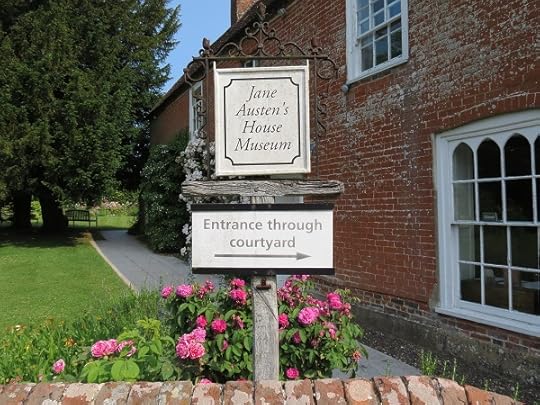
Having just made a big move across the country myself, I was intrigued by the thought that Jane Austen herself—not to mention several of her characters—knew what it took to move an entire household from one place to another.
One of the best resources available to us regarding a big move is the letter Austen wrote to Cassandra on January 3, 1801, prior to their family’s move to Bath from Steventon. From it, and from the details in her novels, we learn many interesting details about what a big move entailed.
If you’ve ever wanted some Regency advice on moving house, this is for you!
 Steventon Rectory, Wikimedia CommonsSend Your Servants Ahead
Steventon Rectory, Wikimedia CommonsSend Your Servants AheadIn terms of logistics, members of the genteel class usually sent servants ahead of them when they went from one house to another, as we see when Mr. Bingley goes to Netherfield:
Why, my dear, you must know, Mrs. Long says that Netherfield is taken by a young man of large fortune from the north of England; that he came down on Monday in a chaise and four to see the place, and was so much delighted with it that he agreed with Mr. Morris immediately; that he is to take possession before Michaelmas, and some of his servants are to be in the house by the end of next week.
Pride and Prejudice

Similarly, Elinor and Marianne, when arriving in London with Mrs. Jennings after three days of travel, are greeted by “all the luxury of a good fire.” The house is “handsome, and handsomely fitted up.” Elinor writes to her mother before a dinner that will not “be ready in less than two hours from their arrival.” It’s clear that Mrs. Jennings employs servants who clean, cook, shop, and prepare the house for her visits.
Hire Good PeopleWhen preparing to move to Bath, Jane Austen’s mother wanted to keep two maids: “My mother looks forward with as much certainty as you can do to our keeping two maids; my father is the only one not in the secret.”
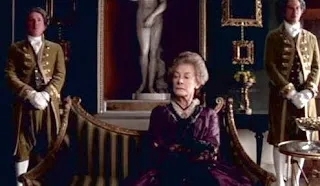
With her typical flair for humor, Austen hoped to engage other servants as well: “We plan having a steady cook and a young, giddy housemaid, with a sedate, middle-aged man, who is to undertake the double office of husband to the former and sweetheart to the latter. No children, of course, to be allowed on either side.”
Do Your ResearchIn Austen’s letter, she talks about several areas of Bath where they hoped to find a house: Westgate Buildings, Charles Street, and “some of the short streets leading from Laura Place or Pulteney Street.”
About Westgate Buildings, Austen wrote: “though quite in the lower part of the town, are not badly situated themselves. The street is broad, and has rather a good appearance.” Regarding Charles Street, she thought it “preferable”: “The buildings are new, and its nearness to Kingsmead Fields would be a pleasant circumstance.” And concerning the third area: “The houses in the streets near Laura Place I should expect to be above our price. Gay Street would be too high, except only the lower house on the left-hand side as you ascend.”
 4 Syndey Place, Bath
4 Syndey Place, BathMrs. Austen seemed to have a preference: “her wishes are at present fixed on the corner house in Chapel Row, which opens into Prince’s Street. Her knowledge of it, however, is confined only to the outside, and therefore she is equally uncertain of its being really desirable as of its being to be had.”
None of the Austens were in favor of Oxford Buildings: “we all unite in particular dislike of that part of the town, and therefore hope to escape.”
Bring Your ArtWe know from Austen’s letter that they planned to take the following pictures and paintings from Steventon to Bath: “[T]he battle-piece, Mr. Nibbs, Sir William East, and all the old heterogeneous miscellany, manuscript, Scriptural pieces dispersed over the house, are to be given to James.”
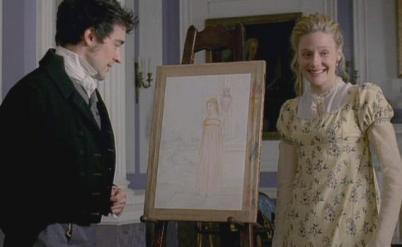 Good artwork is hard to find.
Good artwork is hard to find.Of special note, Jane tells Cassandra, “Your own drawings will not cease to be your own, and the two paintings on tin will be at your disposal.”
Good Furniture is Worth MovingApparently, Rev. and Mrs. Austen had a very good bed that was irreplaceable: “My father and mother, wisely aware of the difficulty of finding in all Bath such a bed as their own, have resolved on taking it with them…” Austen wrote this about the rest of the household beds: “all the beds, indeed, that we shall want are to be removed — viz., besides theirs, our own two, the best for a spare one, and two for servants; and these necessary articles will probably be the only material ones that it would answer to send down.”
When it came to their dressers, they decided it was time for an upgrade: “I do not think it will be worth while to remove any of our chests of drawers; we shall be able to get some of a much more commodious sort, made of deal, and painted to look very neat…”
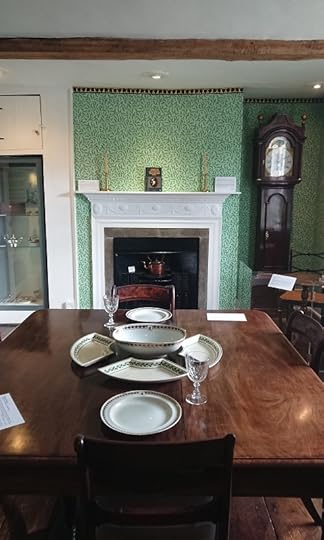 Jane Austen’s House Museum in Chawton.
Jane Austen’s House Museum in Chawton.As to the rest of their furniture, they decided it would be better to replace most of it in Bath: “We have thought at times of removing the sideboard, or a Pembroke table, or some other piece of furniture, but, upon the whole, it has ended in thinking that the trouble and risk of the removal would be more than the advantage of having them at a place where everything may be purchased. Pray send your opinion.”
Jane’s final comments to Cassandra are amusing as ever: “My mother bargains for having no trouble at all in furnishing our house in Bath, and I have engaged for your willingly undertaking to do it all.”
Visit People on the WayIn Austen’s letter, she explains their family travel plans: “[M]y mother and our two selves are to travel down together, and my father follow us afterwards in about a fortnight or three weeks. We have promised to spend a couple of days at Ibthorp in our way. We must all meet at Bath, you know, before we set out for the sea, and, everything considered, I think the first plan as good as any.”
 Ibthorpe, Photo by Rachel DodgeNot So Different
Ibthorpe, Photo by Rachel DodgeNot So DifferentMoving house in Jane Austen’s day was not quite so different from today. Though the modes of transportation and the methods of research and communication were somewhat different, I was delighted to find that the Austens’ moving plans were surprisingly applicable to mine! (Except for the servants.)
The post Jane Austen on the Move appeared first on Rachel Dodge.
July 25, 2022
Kindred Spirits Are Not So Scarce
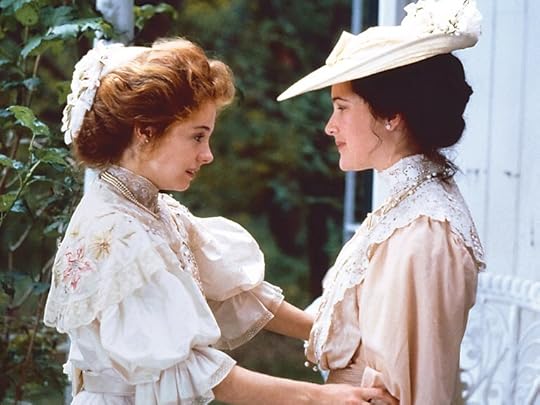
“Kindred spirits are not so scarce as I used to think. It’s splendid to find out there are so many of them in the world.” ― L.M. Montgomery, Anne of Green Gables
When I moved to a new city (and state) earlier this month, I got dreadfully sick on move-in day. I spent the next two weeks in bed and recuperating. But here’s what I learned about illness and newness.
Watch Lists for Sick DaysFirst, good movies never fail. While I was recuperating, I knew I needed some good Anne of Green Gables / Jane Austen / Downtown Abbey type shows or movies to keep me going. I asked for some suggestions on my socials and so many online friends sent well wishes and lots of fun ideas for sick-day movies.
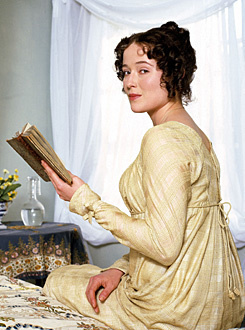
In the comments below, please tell me the shows or movies that get you through sick days. There’s nothing like a warm cup of tea and a lovely movie to help the hours pass!
Good NeighborsPeople care. After we moved in, our next-door neighbor left flowers and a card on our front porch! I texted her to say thank you and to let her know I’d love to meet her in person once I felt better, and she immediately asked if she could get anything from the grocery store for me. I needed a certain brand of vitamins and she went right out and got them. What a good neighbor!!
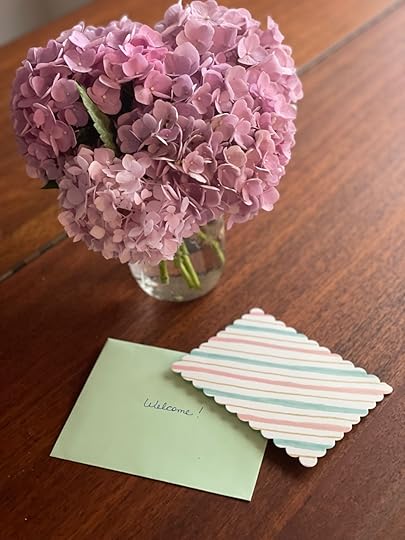 Making Friends
Making FriendsDogs are conversation starters. My kids spent a lot of time those first few weeks walking our dog who is very friendly. They met lots of nice people as they walked up and down the sidewalk. Here’s a picture of our dog if you want to see why he’s a great helper when it comes to making new friends.
 Caring Friends
Caring FriendsThe Body of Christ is amazing. Once my friends “back home” heard I was sick, I soon received a flurry of text messages, calls, and Door Dash gift cards.
Several cards and care packages arrived in the mail. Inside one care package, my friend sent a note, a candle, a packet of tea, and a beautiful book of poetry. Absolutely perfect!

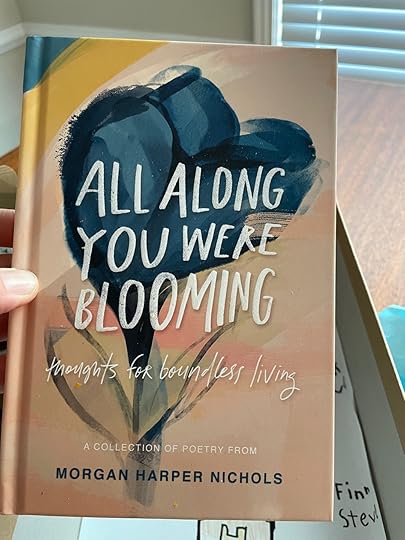
Another friend who lives about an hour from our new home set up a meal train with her friends in the area, even though she just broke her ankle! I can’t begin to express my gratitude to those people who don’t know us but made meals for us and drove so far to care for us.
And a pastor at a local church called to check on us and pray for me over the phone. They sent us a gift card as well. Wow.
Be StillLike most people, I’d much rather be the one to serve others, rather than be the one who is served, but I’m learning to be thankful and be okay with letting people help. It’s okay (and even needful) to be still sometimes.
All of this helped me remember that kindred spirits really aren’t so scarce. They are all around us. Even though I was miserable, God brought good from it all. Because I was so sick, our family received a lot of care and love our first few weeks in our new town – mostly from “strangers.”
More than ever, I want to be someone who truly loves my friends and neighbors well – even if I’ve never met them.
The post Kindred Spirits Are Not So Scarce appeared first on Rachel Dodge.
June 15, 2022
Summery Read: Bloomsbury Girls
One bookshop. Fifty-one rules. Three women who break them all.
Natalie Jenner, the internationally bestselling author of The Jane Austen Society, has gifted us with her newest book, Bloomsbury Girls, just in time for summer! It’s a compelling and heartwarming story of a century-old bookstore and three women determined to find their way in a fast-changing world.
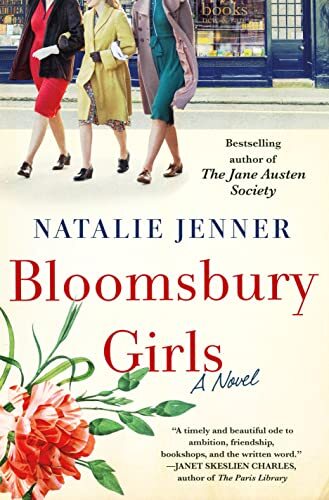 Book Description:
Book Description:Bloomsbury Books is an old-fashioned new and rare book store that has persisted and resisted change for a hundred years, run by men and guided by the general manager’s unbreakable fifty-one rules. But in 1950, the world is changing, especially the world of books and publishing, and at Bloomsbury Books, the girls in the shop have plans:
Vivien Lowry: Single since her aristocratic fiance was killed in action during World War II, the brilliant and stylish Vivien has a long list of grievances–most of them well justified and the biggest of which is Alec McDonough, the Head of Fiction.
Grace Perkins: Married with two sons, she’s been working to support the family following her husband’s breakdown in the aftermath of the war. Torn between duty to her family and dreams of her own.
Evie Stone: In the first class of female students from Cambridge permitted to earn a degree, Evie was denied an academic position in favor of her less accomplished male rival. Now she’s working at Bloomsbury Books while she plans to remake her own future.
As they interact with various literary figures of the time–Daphne Du Maurier, Ellen Doubleday, Sonia Blair (widow of George Orwell), Samuel Beckett, Peggy Guggenheim, and others–these three women with their complex web of relationships, goals and dreams are all working to plot out a future that is richer and more rewarding than anything society will allow.
Purchase the Book HERE My Review
My ReviewBloomsbury Girls is the perfect read for those of us who love a story that’s set in a bookstore and is filled with books and bookish people. As I began to read, it first reminded me of 84, Charing Cross Road by Helene Hanff, a slim volume that is forever memorable for most of us who have read it and/or seen the film. I enjoy books where the setting (the house, the shop, the city) is so special and memorable that it becomes like another character in the reader’s mind. In Jenner’s novel, Bloomsbury Books itself is a very much alive and poignant character–and one I enjoyed immensely.
Beyond the setting and the great bibliophile feels the book provides, Jenner has done an exquisite job of weaving together a beautiful cast of characters and their individual stories. There is depth and complexity to each character, each couple, each department head, each story arc.
Finally, the storylines surrounding the three lead female characters are delightfully drawn. I found myself intrigued by each one, enjoying their individual stories as well as the bigger plot at hand. When they begin to work together and their stories begin to tie together and intertwine, it’s intriguing and delightful. The things they accomplish when they link arms is truly inspiring.
Overall, this is a fun, summery read filled with all the good things I love most. I hope you’ll stop in and visit Bloomsbury Books. Though it may seem like an ordinary British bookstore at first glance, there is so much more going on behind the scenes than meets the eye.
AudiobookIf you have a long car trip ahead, or if you prefer to listen to your books while you work, the audio version of this book promises to be incredible. Acclaimed actor and narrator Juliet Stevenson, CBE, narrated the audiobook for Bloomsbury Girls, with a performance that has been called “vocal virtuosity.”
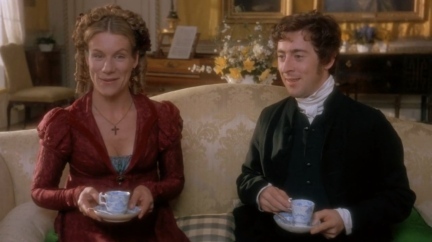
Stevenson is best known for her roles in Emma, Truly, Madly, Deeply, Bend it Like Beckham, Mona Lisa Smile, Being Julia, and Infamous. She is also the BAFTA-nominated and Olivier Award-winning star of many Royal Shakespeare Company and National Theatre productions. Regarded as one of the finest audiobook narrators working today, Stevenson’s other recent narrations include Julian Fellowes’ Belgravia and the collected works of Jane Austen and Daphne du Maurier.
Listen to the beginning of the audiobook here:Stream Bloomsbury Girls by Natalie Jenner, audiobook introduction from MacmillanAudio | Listen online for free on SoundCloudAbout the AuthorNATALIE JENNER is the author of the instant international bestseller The Jane Austen Society and Bloomsbury Girls. A Goodreads Choice Award runner-up for historical fiction and finalist for best debut novel, The Jane Austen Society was a USA Today and #1 national bestseller, and has been sold for translation in twenty countries. Born in England and raised in Canada, Natalie has been a corporate lawyer, career coach and, most recently, an independent bookstore owner in Oakville, Ontario, where she lives with her family and two rescue dogs. Visit her website to learn more.



The post Summery Read: Bloomsbury Girls appeared first on Rachel Dodge.
May 16, 2022
‘You Sink Your Voice’: The Subtle Art of Listening in Persuasion
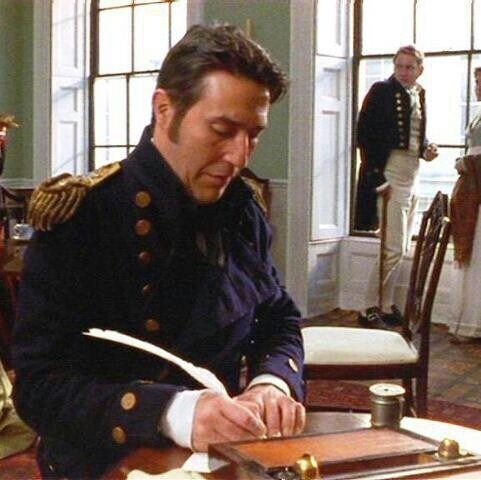
What’s in a voice? According to recent research, quite a lot. In her article “Only 4 Syllables Needed to Recognize Voice,” Madeline McConnell says humans can identify familiar voices in as few as four syllables, or two words. That’s better than some of the most advanced voice recognition software available today.
Here’s how it works in everyday life: Spouses can recognize their mate’s voice across a crowded room. From a young age, “babies are able to distinguish the voice of their mothers from the voices of others” (McConnell). And close friends can hear one another’s voices from an adjacent room.
In the case of Anne Elliot and Captain Wentworth, a word uttered by anyone else truly would not sound so sweet. The way they actively listen to one another—often without speaking directly to one another—plays a crucial role in repairing their relationship, rebuilding their trust, and rekindling their love.
 Anne Listens
Anne ListensThroughout the novel, Austen gives us many important clues about Wentworth’s true feelings for Anne, often through what Anne hears (and overhears) him say. As Anne listens and hopes, she strains to catch hints of Wentworth’s true opinion of her now, to either “its constancy or its change” (Ch. 4). Here are a few key examples of Anne intent listening:
When they meet: “Her eye half met Captain Wentworth’s, a bow, a curtsey passed; she heard his voice.” (Ch. 7)As she listens to his review of the past: “‘That happened before I went to sea in the year six,’ occurred in the course of the first evening they spent together: and though his voice did not falter, and though she had no reason to suppose his eye wandering towards her while he spoke, Anne felt the utter impossibility, from her knowledge of his mind, that he could be unvisited by remembrance any more than herself. There must be the same immediate association of thought, though she was very far from conceiving it to be of equal pain.” (Ch. 8)Her discernment of the voice and mind she knows so well: “When he talked, she heard the same voice, and discerned the same mind.” (Ch. 8)Her keen interest in the “low voice” on the other end of the sofa: “[I]n another moment he was perfectly collected and serious, and almost instantly afterwards coming up to the sofa, on which she and Mrs Musgrove were sitting, took a place by the latter, and entered into conversation with her, in a low voice, about her son, doing it with so much sympathy and natural grace . . .” (Ch. 8)Her reaction to overhearing Wentworth, “in the hedge-row, behind her,” walking and talking with Louisa: “The listener’s proverbial fate was not absolutely hers; she had heard no evil of herself, but she had heard a great deal of very painful import.” (Ch. 10)Her reaction to him “speaking with a glow, and yet a gentleness” to her: “She coloured deeply, and he recollected himself and moved away. She expressed herself most willing, ready, happy to remain.” (Ch. 12)Her intense focus on his words and the sound of his voice: “Whether he would have proceeded farther was left to Anne’s imagination to ponder over in a calmer hour; for while still hearing the sounds he had uttered, she was startled to other subjects by Henrietta, eager to make use of the present leisure for getting out, and calling on her companions to lose no time, lest somebody else should come in. (Ch. 22)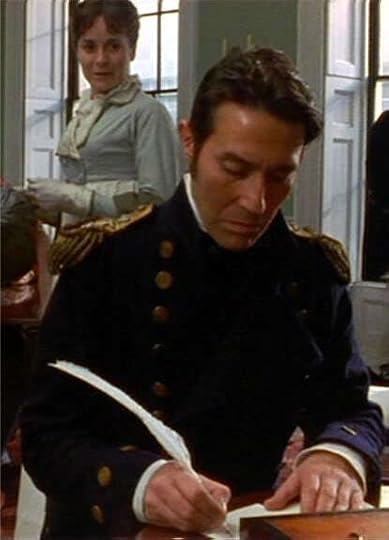
And here especially, we see Anne’s ability to “distinguish” Wentworth’s words even in the midst of a noisy room, when he says, “A man does not recover from such a devotion of the heart to such a woman. He ought not; he does not.”
Wentworth ListensEither from the consciousness, however, that his friend had recovered, or from other consciousness, [Wentworth] went no farther; and Anne who, in spite of the agitated voice in which the latter part had been uttered, and in spite of all the various noises of the room, the almost ceaseless slam of the door, and ceaseless buzz of persons walking through, had distinguished every word, was struck, gratified, confused, and beginning to breathe very quick, and feel an hundred things in a moment. (Ch. 20)
Jane Austen’s Persuasion
This keen sense of listening doesn’t just go one way. Even when he doesn’t look at her, Wentworth listens carefully to Anne. At the end of the novel, we discover the extent to which he has listened to her conversations with others and tried to discern her feelings:
When the topic of Mr. Elliot comes up: “As she spoke, she felt that Captain Wentworth was looking at her, the consciousness of which vexed and embarrassed her, and made her regret that she had said so much, simple as it was.” (Ch. 22)When Charles says “What is Mr. Elliot to me?” and Anne realizes that Wentworth is “all attention, looking and listening with his whole soul; and that the last words brought his enquiring eyes from Charles to herself.” (Ch. 22)How carefully Wentworth listens to Anne’s response to Charles: “She had spoken it; but she trembled when it was done, conscious that her words were listened to, and daring not even to try to observe their effect.” (Ch. 22)Wentworth’s reaction to the topic of parents becoming involved in long or “uncertain” engagements: “Anne found an unexpected interest here. She felt its application to herself, felt it in a nervous thrill all over her; and at the same moment that her eyes instinctively glanced towards the distant table, Captain Wentworth’s pen ceased to move, his head was raised, pausing, listening, and he turned round the next instant to give a look, one quick, conscious look at her.” (Ch. 23)When Wentworth tunes in to Anne’s conversation with Captain Harville about love affairs and constancy of heart between the sexes: “a slight noise called their attention to Captain Wentworth’s hitherto perfectly quiet division of the room. It was nothing more than that his pen had fallen down; but Anne was startled at finding him nearer than she had supposed, and half inclined to suspect that the pen had only fallen because he had been occupied by them, striving to catch sounds, which yet she did not think he could have caught.” (Ch. 23)
The most stunning piece of evidence is Captain Wentworth’s letter to Anne, which he drafts while listening to her conversation with Captain Harville:
I had not waited even these ten days, could I have read your feelings, as I think you must have penetrated mine. I can hardly write. I am every instant hearing something which overpowers me. You sink your voice, but I can distinguish the tones of that voice when they would be lost on others. (Ch. 23)
Jane Austen’s Persuasion
Wentworth’s words reveal that he was not only listening carefully to Anne during the letter-writing scene, but that he has been listening to her throughout the novel. Indeed, Anne’s voice is something like a siren call to the seafaring Captain Wentworth. No matter how hard he has tried to forget her, he has “never seen a woman since whom he thought her equal” and has only “imagined himself indifferent” (Ch. 23).
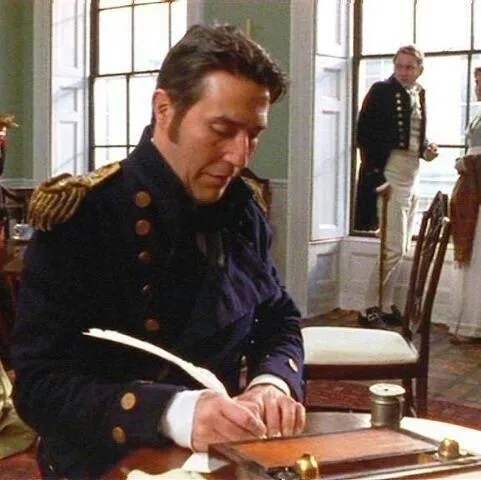 Rekindled Love
Rekindled LoveThough Anne and Wentworth’s initial courtship was brief, and though they have not seen each other for many long years, Austen shows us the depth of their true feelings through what they say (and don’t say). While this article only covers some of the most pointed examples of the subtle communication between these two characters, a close reading of the novel reveals so much more. Austen shows us throughout the novel—through gestures, looks, and glances—just how aware they both are of one another in every scene, in every room, and in every situation.
Indeed, Austen builds much of the romantic tension between Anne and Wentworth based more on what they say to other people than on what they say to one another. Throughout the novel, she uses listening and, yes, eavesdropping, as a clever literary technique. As Anne listens in on Wentworth’s conversations, analyzing his every word, phrase, tone, and inflection, we listen in as well, gathering clues as we go. And as she begins to dare to hope, so do we.
The art of listening well in Persuasion plays an important role in reigniting an old flame, rekindling lost love, and soothing broken hearts, helping to make Anne and Wentworth “more exquisitely happy, perhaps, in their re-union, than when it had been first projected.”
How well do you listen to the ones you love?
The post ‘You Sink Your Voice’: The Subtle Art of Listening in Persuasion appeared first on Rachel Dodge.
May 8, 2022
Ode to My Favorite Literary Mamas
Happy Mother’s Day, Kindred Spirits! Who are you most favorite literary mothers? There are so many mothers and mother figures I look up to in my favorite books, but I have to give a special shout out to these special literary mamas:
Marilla CuthbertMarilla Cuthbert might be strict, pragmatic, and stiff, but she has a tender heart and a soft spot for Anne. There’s a “saving something about her mouth which, if it had been ever so slightly developed, might have been considered indicative of a sense of humor.” Marilla is the mother I most enjoy watching develop. She goes from being hard and no-nonsense to completely lovable and dear.
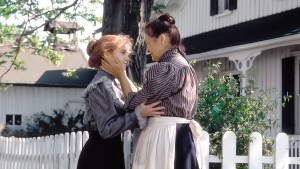 Ma Ingalls
Ma IngallsCaroline Ingalls is practical and no-nonsense and yet so kind and gentle. She didn’t mess around, but she loved and taught her girls so well. She can make a meal out of pretty much anything and find a way to make things special, even in the midst of grasshoppers, blizzards, drought, or famine.
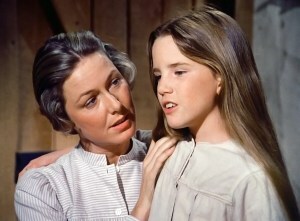 Marmee
MarmeeMrs. March is that mother who exemplifies everything we want in a mom and everything we want to be AS moms. She is patient, clever, kind, witty, and creative. She can teach a lesson with wise words, a gentle reprimand, or a cleverly-devised experiment. She’s well-read, she’s learned to curb her temper well, and she’s compassionate to her neighbors.

I honestly think that the “book moms” in my life shaped how I related to my own mother, in appreciating her and looking up to her, and also in how I wanted (and still want) to be as a mama myself.
That’s just my top 3! Tell me about your most favorite book moms in the comments below and why you love them so!
Mamas, aunties, and grandmas come in many shapes and sizes, and I am so thankful for all the women in my life who have loved and mentored and befriended me over the years!
Grace and peace,
Rachel
The post Ode to My Favorite Literary Mamas appeared first on Rachel Dodge.



